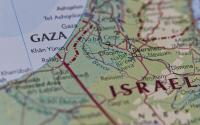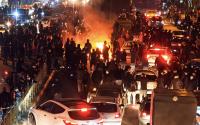5 February 2006Jerome R. Corsi
Beginning in 2003, Iran began demanding oil payment in euros, not dollars, although the oil itself was still priced in U.S. currency. Now, Iran is seriously considering establishing an Iranian Oil Bourse, with the goal of competing with the New York Mercantile Exchange, NYMEX, and London's International Petroleum Exchange, IPE. Right now, the NYMEX and IPE use three oil "markers" to establish price – West Texas Intermediate crude, Norway Brent crude and the UAE Dubai crude. With the establishment of an Iranian Oil Bourse, Tehran wants to create a fourth oil marker, this one priced in the euro. In 2000, as Saddam Hussein continued to sell the United Nations on what became the "oil for food" scandal, Iraq received U.N. permission to sell Iraqi oil for euros, not dollars. Saddam even received permission from the U.N. to convert the $10 billion oil-for-food reserve fund from dollars to euros. Many administration critics argue today that the real reason for invading Iraq in 2003 was not to remove WMD from Iraq or to establish freedom but to preserve the dollar dominance of the world's oil market. These same critics argue today that the real reason for the ramp-up of concern over Iran has nothing to do with Iran's secret nuclear weapons program or with President Ahmadinejad's threats to destroy Israel but everything to do with oil. If the Iranians persist in creating a market mechanism to settle world oil transactions in the euro, the United States will attack just to preserve the oil market for the dollar. Today, about 70 percent of the world's international foreign currency reserves are held in dollars. If the petroeuro begins to challenge the petrodollar, this percentage could diminish drastically. The United States depends on the dollar foreign-currency reserves in order to sell the Treasury debt that sustains budget deficits. What if foreign-exchange portfolios from oil sales fell to 60 percent being held in dollars – would that cause a crisis in the U.S. economy? Or would it take 55 percent? Most Americans are completely unaware of this threat Iran represents to the U.S. economy. The Iranians, however, are fully aware of what they are threatening, and so are top economic experts within the administration. The Islamic world also has realized that America is at risk because we no longer have a gold-backed currency. For years, former Malaysian Prime Minister Mahathir Mohamad has championed a move for the Muslim nations of the world to establish the gold dinar as the standard currency for settling international oil transactions. In November 2002, the West Malaysian Royal Mint reissued the gold dinar that was in common use in the Muslim world during the Ottoman Empire. The idea would be to challenge the dollar by arguing that a fixed-value currency backed in gold is more resistant to devaluation than a floating dollar such as the U.S. has had since the administration of Richard Nixon. In writing "Black Gold Stranglehold: The Myth of Scarcity and the Politics of Oil," Craig Smith and I argued that the United States should seriously consider establishing a gold-backed international-trade dollar to preserve stability and value in the international oil market. Clearly, any threat to petrodollar holdings could undermine social programs in the U.S., including Medicare and key welfare programs such as Temporary Assistance for Needy Families. How close is Iran to opening the Iranian Oil Bourse? The Iranian Oil Bourse is scheduled to be opened in March. Curiously, that is the same month Israel has quietly set as a deadline for a diplomatic resolution of the Iranian nuclear crisis. Last year, President Bush was ready to concede to his liberal Democratic Party critics, allowing the EU-3 and the IAEA to lead the negotiations with Iran. Our guess is that if Iran does open an oil bourse as planned in March, Bush will take the gloves off. The Bush administration might play with a nuclear Iran, comfortable with intelligence estimates that Iran needs much more time to produce a bomb. Maybe Iran should look more closely at the lesson of Saddam Hussein. We didn't find the WMDs our faulty intelligence claimed were in Iraq, but Hussein was trading in pertoeuros, with the full blessing of the U.N. If Iran does open an oil bourse next month, we should expect the warplanes will soon thereafter begin to fly. Jerome R. Corsi received a Ph.D. from Harvard University in political science in 1972 and has written many books and articles, including co-authoring with John O'Neill the No. 1 New York Times best-seller, "Unfit for Command: Swift Boat Veterans Speak Out Against John Kerry." Dr. Corsi's most recent books include "Black Gold Stranglehold: The Myth of Scarcity and the Politics of Oil," which he co-authored with WND columnist Craig. R. Smith, and "Atomic Iran: How the Terrorist Regime Bought the Bomb and American Politicians."© 2006 WorldNetDaily.com






